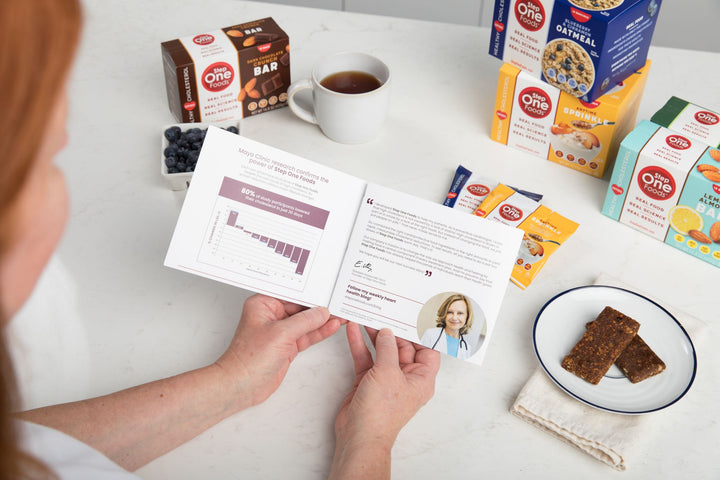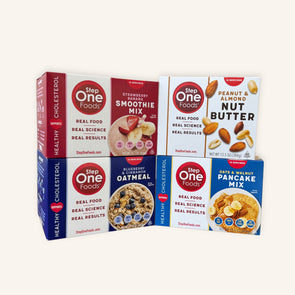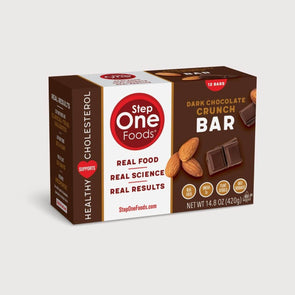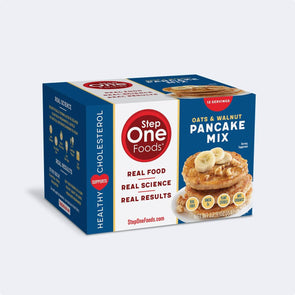

Get Help With Weight Gain, Obesity and High Cholesterol
Obesity and high cholesterol are both conditions that can lead to serious health issues if left untreated. Often, these two conditions can go hand-in-hand, as those who are overweight or obese often have high cholesterol as well. In this article we’ll cover the link between these two conditions, how Step One Foods can help with high cholesterol and more. Let’s dive in.
How Are They Related?
Obesity and excess weight are closely linked to high cholesterol. Those who are overweight are at a higher risk of developing high cholesterol because excess weight impacts the way our bodies process lipoproteins like cholesterol and triglycerides.
Obesity is linked to higher LDL (bad) cholesterol levels and lower HDL (good) cholesterol levels. It is also linked to high triglyceride levels, which are fats that can increase your risk of pancreatitis (a painful inflammation of the pancreas) if the levels are too high.
Fortunately, losing excess weight can help lower cholesterol in individuals who are overweight or obese.Studies have shown that losing as little as 10 pounds can help lower cholesterol levels.
What Is Obesity?
Obesity is a health condition characterized by excess accumulation of body fat. Determining whether someone has this condition is often based upon the Body Mass Index (BMI), a measurement which assesses weight relative to height. A BMI of 30 or more is categorized as obese, whereas a BMI between 25 and 29.9 is categorized as overweight. However, this isn’t a perfect measurement system, so waist circumference is sometimes also measured to diagnose obesity.
Obesity is a serious health concern that can increase the risk for numerous conditions like diabetes, heart disease, certain cancers and more. It’s important to address obesity to minimize the risks associated with the condition.
Common Signs & Symptoms
Obesity can usually be self-diagnosed, as excessive body weight can be an obvious symptom. As mentioned, having a certain BMI and weight circumference can be an indicator of obesity or being overweight. For quick reference, those numbers are:
- Obesity - BMI of 30 or greater
- Overweight - BMI of 25 to 29.9
- Waist circumference - Over 40 inches in men, over 35 inches in women
You may also need to measure body fat percentage to confirm a diagnosis. Carrying excess body fat may lead to fatigue, shortness of breath during activity, back pain, excessive sweating, high blood pressure, high cholesterol and increased snoring.
What Are the Causes?
Several factors can contribute to obesity, but typically the main factor is taking in more calories than are burned. This situation is especially common in the Western world, where diets are dense with calories and most jobs are sedentary.
Along with the imbalance of calories and activity, obesity can be exacerbated by genetic factors, environmental factors, certain medical conditions, hormonal imbalances and certain medications.
Overweight vs. Obese
Being overweight and being obese are both defined by carrying excess body fat, but there is a distinction between the two. Overweight individuals have a BMI that falls between 25 and 29.9 while obese individuals have a BMI of 30 or above. As mentioned, this isn’t a perfect measuring method. For instance, someone who is especially muscular may fall into one of these BMI ranges even if they’re not overweight. This is why it’s best to get diagnosed by a health care provider if you’re unsure. They can decide through other measurements.
Risk Factors & Complications of Excess Weight
Several risk factors can increase your risk for obesity. These include:
Genetics - Genetics and family history can play a role in obesity.
Lifestyle - A major risk factor for obesity is lifestyle choices like an unhealthy diet and a sedentary lifestyle.
Medications and conditions - Certain medications and medical conditions can increase your risk for developing obesity.
Socioeconomic factors - Factors like lack of access to healthy foods and safe places to exercise and walk can contribute to obesity.
Age - You can become more prone to obesity as you age.
Obesity can increase the risk for numerous health complications, such as high blood pressure, high cholesterol, type 2 diabetes, heart disease, joint problems, certain cancers and psychological issues like depression and anxiety.
Testing & Diagnosis
Diagnosing obesity involves measuring BMI, waist circumference and body fat percentage. Your health care provider may only need one of these metrics to diagnose obesity. If you’re diagnosed as overweight or obese, your doctor may also want to conduct additional tests to look for other conditions like high blood pressure and high cholesterol.
What is High Cholesterol?
High cholesterol is a condition where too much cholesterol is circulating in the bloodstream. Our bodies need cholesterol for certain functions, but too much can cause health issues. High cholesterol can increase your risk for heart disease and stroke, so it’s important to treat elevated cholesterol levels.
Common Signs & Symptoms
High cholesterol is typically asymptomatic. This is why it’s important to get regular checkups, as a blood test will be required to determine if your cholesterol levels are in a healthy range.
What Are the Causes?
There are various lifestyle choices that can lead to high cholesterol. These include: make each new title bold and begin each with a new
Tobacco use - Smoking can increase the levels of LDL (bad) cholesterol and lower HDL (good) cholesterol in the bloodstream.
Diet - A diet heavy in saturated fats and added sugars can raise LDL cholesterol. Some foods to avoid or reduce include red meat, baked goods and fried foods.
Excessive alcohol consumption - Alcohol can raise your cholesterol levels.
Sedentary lifestyle - Being sedentary and not getting enough exercise can raise cholesterol levels.
Good Cholesterol (HDL) vs. Bad Cholesterol (LDL)
There are two primary types of cholesterol to know about. The first is high-density lipoprotein (HDL) cholesterol. This is known as the “good” cholesterol because it helps remove cholesterol from your body.
The other type is low-density lipoprotein (LDL) cholesterol. This is considered the “bad” cholesterol. It can contribute to plaque buildup in your arteries, which increases your risk for heart disease and stroke.
Risk Factors & Complications
Lifestyle choices, certain health conditions, certain medications, genetics, age and being overweight or obese are all risk factors for high cholesterol.
High cholesterol can increase your risk of serious health complications, like heart disease and stroke.
Testing & Diagnosis
High cholesterol can only be diagnosed through blood tests. These tests measure total cholesterol, HDL, LDL and triglycerides. If you have high cholesterol, your provider can implement a treatment plan to help you lower cholesterol levels.
When To See a Doctor
You should make an appointment with your doctor if you have excess weight, particularly if it’s affecting your quality of life. While losing weight can be achieved on your own, it’s a good idea to have medical supervision. A medically supervised weight loss plan ensures you’re losing weight safely and can be tailored to your specific health needs. This is especially true for those who have persistent struggles keeping weight off. A health care provider can also determine if there are underlying issues that may be contributing to your weight, along with identifying any other health concerns like high cholesterol that often accompany obesity and excess weight.
Treatment & Common Medications
Obesity and high cholesterol have very similar treatment plans, with both focusing on lifestyle changes. These lifestyle changes include a healthy, balanced diet and regular exercise.
In some cases, medications may also be recommended. For obesity, there are several prescription weight loss medications that your doctor may decide are right for you. For cholesterol, statins are some of the most common cholesterol-lowering medications. Other cholesterol-lowering medications include ezetimibe,, bempedoic acid, bile-acid-binding resins and PCSK9 inhibitors.
In cases of severe obesity, bariatric surgery may be an option. This is typically a last resort when lifestyle changes and medications have proven to be insufficient.
Healthy Diet & Lifestyle Tips To Follow
If you’re overweight, obese or have high cholesterol, there are some commonly recommended diet and lifestyle tips you can follow.
A heart-healthy diet is often recommended as part of the treatment plan for both of these conditions. A heart-healthy diet focuses on fruits, vegetables, whole grains and lean proteins. It also involves avoiding foods with excessive sodium, saturated fats and added sugars.
Regular exercise is also recommended. Aerobic exercise like walking, running, cycling and swimming promote both heart health and weight loss.
Finally, treatment plans also recommend quitting smoking and limiting alcohol consumption.
Customer Favorites
Frequently Asked Questions
High cholesterol does not directly cause weight gain, but the lifestyle factors that contribute to high cholesterol can lead to weight gain. Poor dietary habits, lack of physical activity and other risk factors can contribute to weight gain, which is why these two conditions often coexist.
Losing weight can have a positive impact on your cholesterol levels. Losing as little as 10 pounds if you’re overweight or obese can lead to a decrease in LDL cholesterol and triglyceride levels while increasing HDL cholesterol.
Lowering cholesterol involves a holistic treatment plan that focuses on lifestyle changes. These changes include adopting a heart-healthy diet, exercising, quitting smoking and limiting alcohol. In some cases, it may also include prescription medications like statins.
High cholesterol can be purely genetic. Familial hypercholesterolemia is a relatively rare inherited condition that affects how your body processes cholesterol. In most people, even when a genetic predisposition is present, lifestyle factors are major contributors to abnormal cholesterol levels.

Learn How Step One Foods Can Help You Lower Your Cholesterol Levels
Step One Foods are clinically formulated to help lower cholesterol by incorporating essential cholesterol modulating nutrients like plant sterols, fiber, antioxidants and Omega-3s into every serving. There are various items to choose from, including bars, smoothies, pancake mixes and oatmeal. All the foods are portion controlled and made with natural high fiber whole-food ingredients so no calorie is wasted.
Adding Step One Foods into your diet is simple. Just exchange something similar you’re already eating with two Step One Foods items per day. Just this little swap can be enough to reduce your intake by 200 calories per day, translating into a 20 pound weight reduction in one year! Shop our online store and order your Step One Foods solution today!



